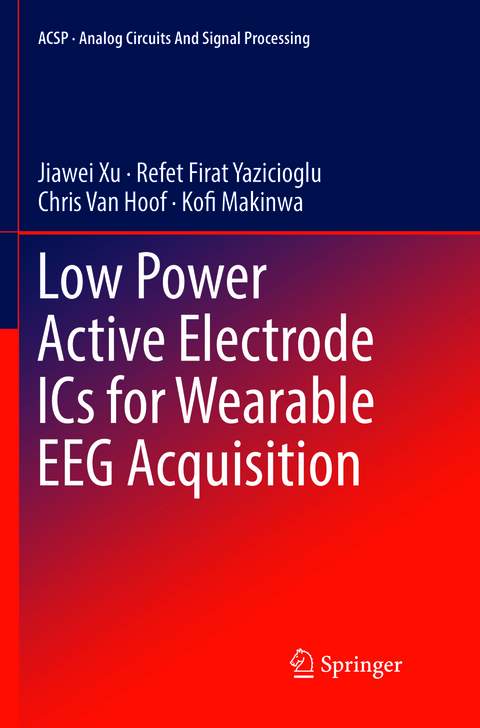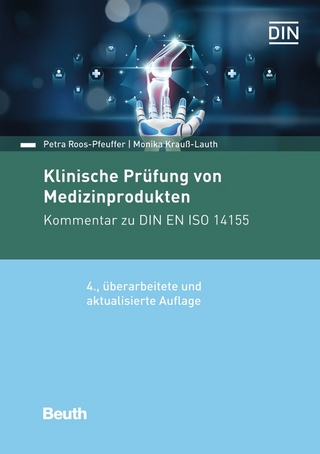
Low Power Active Electrode ICs for Wearable EEG Acquisition
Springer International Publishing (Verlag)
978-3-319-89284-9 (ISBN)
Jiawei Xu received his M.Sc and Ph.D degrees in 2006 and 2016, both from Delft University of Technology, the Netherlands. From 2006, he has been working at Holst Centre/imec on low power sensor interfaces and wearable biomedical ICs. He is currently a senior researcher, leading the R&D on brain monitoring circuits and systems for wearable healthcare. He has developed biomedical signal acquisition ICs for EEG, ECG, bio-impedance, galvanic skin response (GSR) and near-infrared spectroscopy (NIRS). Dr. Xu was the recipient of the IEEE Solid-State Circuits Society (SSCS) Predoctoral Achievement Award (2014) and the imec Scientific Excellence Award (2014). Refet Firat Yazicioglu is the head of Neuromodulation Devices at Galvani Bioelectronics R&D and responsible for the development of implantable devices and creation of new technologies for implantable devices. He received his PhD degree from KU Leuven in Belgium and worked 13 years at imec, Europe's largest independent research centre in microelectronics and nanoelectronics. He has developed wearable and implantable medical devices, including wireless cardiac monitoring patches, wearable EEG monitoring headsets and implantable neural probes for high density recording. Dr. Yazicioglu has served in the technical program committees of the European Solid State Circuits Conference (ESSCIRC), the International Solid State Circuits Conference (ISSCC), and the Biomedical Circuits and Systems Conference (BioCAS). He is Associate Editor for IEEE Transactions on Biomedical Circuits and Systems. Chris Van Hoof received a PhD in Electrical Engineering from the University of Leuven in collaboration with imec in 1992. At imec, he became successively head of the detector systems group (in 1998), director of the microsystems department (in 2002) and Integrated Systems Department (in 2004), and program director (in 2007). Since 2009 he is department director and program director of HUMAN++ in the smart systems unit at imec in Leuven and the HOLST Centre in Eindhoven. Integrated microsystems research focuses on the application of advanced technology for the creation of miniature components and subsystems, ultra-low power wearable wireless sensor systems, and smart implantable devices. Since 2000 Chris Van Hoof is also a guest professor at the University of Leuven.
Chapter 1.Introduction.- Chapter 2. Review of Bio-Amplifier Architectures.- Chapter 3. An Active Electrode Readout Circuit.- Chapter 4. An 8-Channel Active Electrode System.- Chapter 5. Current Noise of Chopper Amplifiers.- Chapter 6. A Digital Active Electrode System.- Chapter 7. Conclusions.
| Erscheinungsdatum | 05.03.2019 |
|---|---|
| Reihe/Serie | Analog Circuits and Signal Processing |
| Zusatzinfo | XIII, 125 p. 124 illus., 92 illus. in color. |
| Verlagsort | Cham |
| Sprache | englisch |
| Maße | 155 x 235 mm |
| Gewicht | 224 g |
| Themenwelt | Medizin / Pharmazie ► Physiotherapie / Ergotherapie ► Orthopädie |
| Technik ► Elektrotechnik / Energietechnik | |
| Schlagworte | Bio-Medical CMOS ICs • Biopotential Readout Circuits • Chopper Amplifiers • IC Design for Wireless Neural Interfaces • Ultra Low-Power Integrated Circuit Design |
| ISBN-10 | 3-319-89284-3 / 3319892843 |
| ISBN-13 | 978-3-319-89284-9 / 9783319892849 |
| Zustand | Neuware |
| Informationen gemäß Produktsicherheitsverordnung (GPSR) | |
| Haben Sie eine Frage zum Produkt? |
aus dem Bereich


